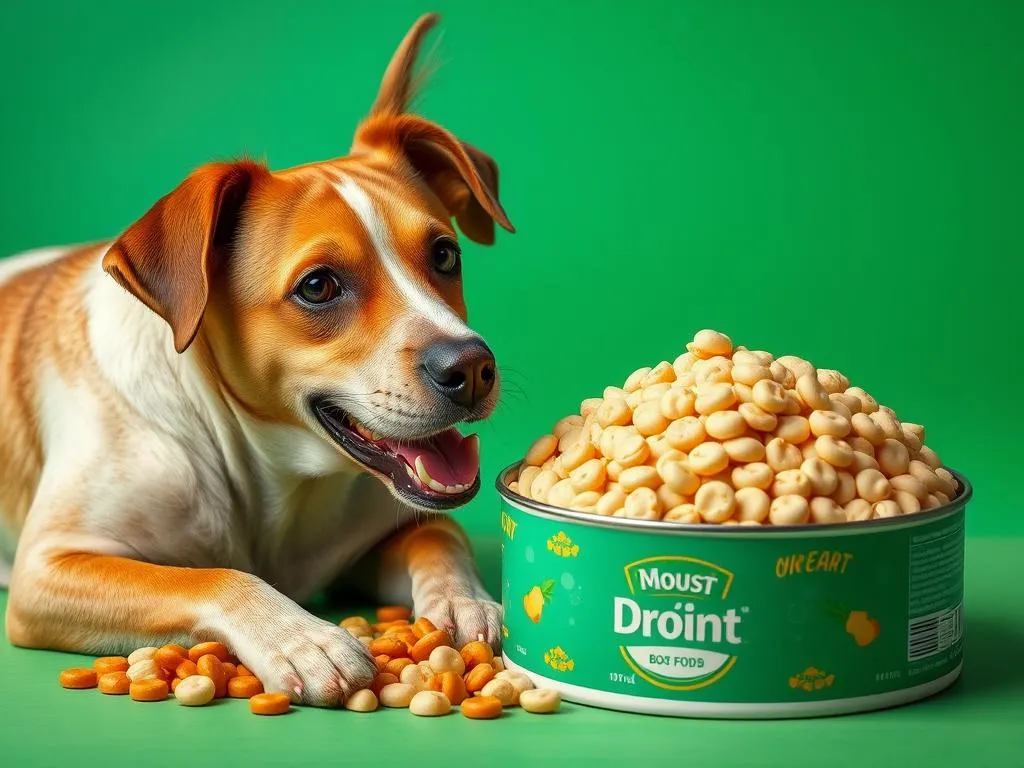
Introduction
Dog nutrition is a vital aspect of pet ownership that directly impacts your furry friend’s health, longevity, and overall well-being. Proper nutrition ensures that dogs receive the necessary nutrients to thrive, maintain energy levels, and support their immune system. This article will focus on best moist dog foods, exploring their benefits, key ingredients to consider, and top brands you might want to include in your dog’s diet.
As we delve into this topic, we will cover the essentials of dog nutrition, the significance of moisture in dog food, and provide practical tips for transitioning your dog to a moist diet. Additionally, we will share some homemade moist dog food recipes and debunk common myths surrounding dog nutrition.
Understanding Dog Nutrition
Basic Nutritional Needs of Dogs
Every dog requires a balanced diet that includes macronutrients and micronutrients. The three primary macronutrients are:
- Proteins: Essential for growth, maintenance, and repair of body tissues. Proteins are crucial for building muscles and supporting the immune system.
- Fats: Provide a concentrated source of energy, support cell function, and aid in the absorption of fat-soluble vitamins (A, D, E, K). Healthy fats also contribute to a shiny coat and healthy skin.
- Carbohydrates: Serve as a source of energy and help with digestive health. While dogs can digest carbohydrates, they should not be the primary component of their diet.
Micronutrients, including vitamins and minerals, are also vital for various bodily functions. They play a role in everything from bone health to immune system support.
Life Stages and Nutritional Requirements
Dogs have different nutritional needs depending on their life stage:
- Puppies: Require a diet rich in proteins and fats to support their rapid growth and development. Puppy-specific foods are formulated with higher calories and essential nutrients.
- Adults: Need a balanced diet to maintain their health. Adult dog foods contain the right amount of proteins, fats, and carbohydrates to support energy needs.
- Senior Dogs: Often require fewer calories but higher amounts of fiber to support digestive health. Senior dog foods may also include joint-supporting ingredients like glucosamine.
Pregnant or nursing dogs have increased nutritional needs, requiring more calories and higher quality protein to support the growth of their puppies.
What Are Moist Dog Foods?
Definition and Types of Moist Dog Foods
Moist dog foods are characterized by their higher moisture content, usually consisting of about 75-80% water. They can be divided into two main categories:
- Canned Dog Foods: These are commercially prepared and sealed in cans. They often contain a mix of meats, vegetables, and grains, providing a complete and balanced diet.
- Semi-Moist Foods: These usually come in pouches and contain about 25-40% moisture. They are often more palatable and easier to serve than dry kibble.
You can also create homemade moist dog food using fresh ingredients like meats, vegetables, and grains.
Benefits of Moist Dog Foods
Moist dog foods offer several advantages:
- Hydration Benefits: The high moisture content helps keep dogs hydrated, which is especially beneficial for those that do not drink enough water.
- Palatability: Many dogs prefer the taste and texture of moist foods, making them ideal for picky eaters or dogs with reduced appetites.
- Nutrient Density: Moist foods are often nutrient-dense, allowing for better absorption of essential nutrients, making them easier to digest.
Key Ingredients to Look For in the Best Moist Dog Foods
When selecting moist dog food, it’s crucial to examine the ingredients. Here are some key components to consider:
High-Quality Proteins
Proteins should be the primary ingredient in your dog’s diet. Look for foods that list meat sources as the first ingredient. Quality protein sources include:
- Chicken
- Beef
- Lamb
- Fish
- Turkey
Healthy Fats
Fats are essential for energy and overall health. Look for moist dog foods that include healthy fats, such as:
- Chicken fat
- Fish oil
- Flaxseed oil
Essential fatty acids, like Omega-3 and Omega-6, are beneficial for skin and coat health.
Whole Grains and Vegetables
Whole grains and vegetables provide fiber and carbohydrates, supporting digestive health. Recommended grains include:
- Brown rice
- Oatmeal
- Barley
Vegetables such as carrots, peas, and sweet potatoes offer vitamins and minerals.
Avoiding Harmful Ingredients
Be cautious of fillers and artificial additives, which can be detrimental to your dog’s health. Avoid foods that contain:
- Corn and soy fillers
- Artificial colors and preservatives
- By-products and unspecified meats
Always read labels carefully to ensure you provide your dog with high-quality nutrition.
Top 5 Best Moist Dog Foods
To help you make an informed decision, here are five best moist dog foods currently on the market:
Brand One: Overview and Key Features
Nutritional Breakdown: This brand’s wet food contains high-quality chicken as the main protein source and includes a mix of vegetables and whole grains.
Pros:
– High protein content
– Grain-inclusive for balanced nutrition
Cons:
– Some dogs may prefer dry food
Brand Two: Overview and Key Features
Nutritional Breakdown: This option features beef as the primary ingredient, supplemented with peas and carrots for added vitamins.
Pros:
– Great taste for picky eaters
– Rich in essential fatty acids
Cons:
– Higher calorie count may not suit all dogs
Brand Three: Overview and Key Features
Nutritional Breakdown: This brand offers a unique fish-based formula, providing Omega-3 fatty acids for joint health and a shiny coat.
Pros:
– Excellent for dogs with food sensitivities
– High moisture content aids hydration
Cons:
– Limited availability in some areas
Brand Four: Overview and Key Features
Nutritional Breakdown: Featuring lamb as the primary protein, this food includes brown rice and sweet potatoes for fiber and digestibility.
Pros:
– Hypoallergenic formula for sensitive dogs
– High-quality ingredients
Cons:
– Some dogs may not like the taste
Brand Five: Overview and Key Features
Nutritional Breakdown: This canned food contains a blend of turkey and chicken, with added vegetables for a complete diet.
Pros:
– Affordable price point
– Convenient packaging
Cons:
– Contains some fillers
How to Transition Your Dog to Moist Foods
Signs Your Dog May Benefit from Moist Food
If you notice signs like dehydration, dry skin, or difficulty chewing dry kibble, it may be time to consider moist dog food. Additionally, if your dog shows signs of kibble fatigue—losing interest in their regular food—a transition to moist food can reignite their appetite.
Step-by-Step Transition Process
To successfully transition your dog to moist foods, follow these steps:
- Start Slow: Begin by mixing a small amount of the new moist food with your dog’s current food.
- Gradually Increase: Over the course of 7-10 days, slowly increase the proportion of moist food while decreasing the dry food.
- Monitor Digestive Health: Keep an eye on your dog’s stool and overall health. If you notice any digestive upset, slow down the transition process.
- Stay Consistent: Once your dog has fully transitioned, maintain a consistent feeding routine to help establish a healthy habit.
Homemade Moist Dog Food Recipes
Benefits of Homemade Diets
Creating homemade moist dog food allows you to control the ingredients and ensure your dog receives the best nutrition possible. Additionally, it can be a fun and rewarding process.
Simple Moist Dog Food Recipes
Recipe One: Protein-rich Chicken Stew
Ingredients:
– 2 chicken breasts (boneless)
– 1 cup carrots (chopped)
– 1 cup peas
– 2 cups low-sodium chicken broth
Instructions:
1. Boil the chicken until cooked through, then shred.
2. In a pot, combine the chicken, carrots, peas, and broth.
3. Simmer for 20 minutes and let cool before serving.
Recipe Two: Beef and Vegetable Mix
Ingredients:
– 1 pound ground beef
– 1 cup sweet potatoes (cubed)
– 1 cup green beans (chopped)
– ½ cup low-sodium beef broth
Instructions:
1. Brown the ground beef in a skillet.
2. Add sweet potatoes and green beans, then pour in the beef broth.
3. Simmer until vegetables are tender. Allow to cool before serving.
Recipe Three: Fish and Sweet Potato Blend
Ingredients:
– 1 can of tuna (in water)
– 1 cup sweet potatoes (mashed)
– ½ cup peas
– 1 tablespoon olive oil
Instructions:
1. Mix all ingredients in a bowl until well combined.
2. Serve as a topping or standalone meal.
Common Myths About Dog Nutrition
Myth: Dogs are Carnivores
While dogs are often thought of as carnivores, they are actually omnivores. This means they can thrive on a diet that includes both animal and plant-based ingredients.
Myth: Grain-Free is Always Better
Grain-free diets are not necessarily healthier for dogs. Many dogs can digest grains without issues, and whole grains can provide beneficial nutrients and fiber.
Myth: All Human Foods are Dangerous
Not all human foods are harmful to dogs. Foods like carrots, blueberries, and cooked lean meats can be safe and healthy treats. Always check with your veterinarian before introducing new foods.
Conclusion
Proper dog nutrition is essential for maintaining your pet’s health and happiness. Choosing the best moist dog foods can provide hydration, improve palatability, and ensure your dog receives the nutrients they need. As you explore options, remember to consult with your veterinarian for personalized dietary advice tailored to your dog’s specific needs.
FAQs
What should I look for in moist dog food?
Look for high-quality protein sources, healthy fats, whole grains, and vegetables. Avoid fillers and artificial additives.
Can I mix moist dog food with dry kibble?
Yes, you can mix moist and dry foods, but be mindful of the total caloric intake and adjust portions accordingly.
How often should I feed my dog moist food?
Feeding frequency will depend on your dog’s age, activity level, and dietary needs. Consult your veterinarian for personalized recommendations.
Are there any allergies to consider with moist foods?
Yes, some dogs may have food allergies. Common allergens include beef, chicken, and grains. Monitor your dog for any adverse reactions when introducing new foods.
Is it okay to feed my dog homemade moist food?
Yes, homemade moist dog food can be nutritious and beneficial, but it’s essential to ensure it is balanced and meets your dog’s nutritional needs.









